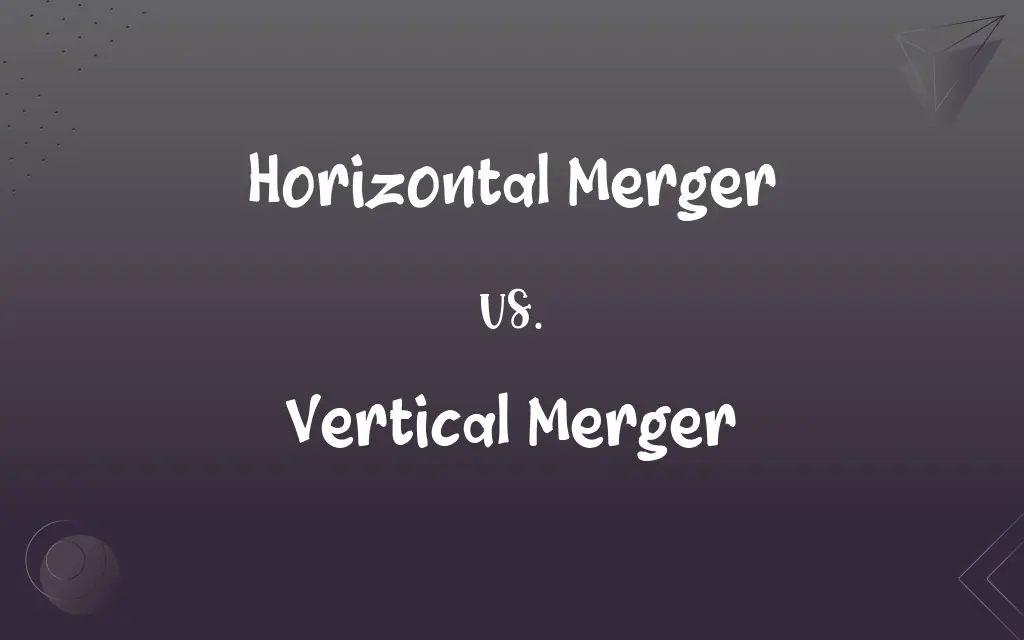Horizontal Merger vs. Vertical Merger: What's the Difference?
Edited by Aimie Carlson || By Harlon Moss || Published on March 2, 2024
A horizontal merger involves companies at the same stage in the same industry, while a vertical merger is between companies at different stages of the same supply chain.

Key Differences
Horizontal mergers occur between companies operating at the same level within the same industry, often competitors. Vertical mergers involve companies at different stages of production or supply chain within the same industry.
Horizontal mergers aim to increase market share, reduce competition, or achieve economies of scale. Vertical mergers seek to streamline operations, control more of the supply chain, or reduce production costs.
A horizontal merger can change competitive dynamics by consolidating market power. A vertical merger, however, may lead to increased efficiency and control over supply and distribution channels.
Horizontal mergers are often closely scrutinized for antitrust concerns, as they can lead to reduced competition. Vertical mergers, while also reviewed, typically face less antitrust scrutiny unless they create barriers to market entry.
A horizontal merger example is two competing smartphone manufacturers merging. A vertical merger example is a car manufacturer merging with a tire supplier.
ADVERTISEMENT
Comparison Chart
Industry Position
Companies at the same level in the same industry
Companies at different stages of the same supply chain
Objective
Increase market share, reduce competition
Streamline operations, control supply chain
Market Impact
May consolidate market power
Can increase efficiency, control over supply and distribution
Regulatory Concerns
High scrutiny for antitrust issues
Less antitrust scrutiny, unless creating market barriers
Practical Examples
Two competing manufacturers merging
Manufacturer merging with a supplier or distributor
ADVERTISEMENT
Horizontal Merger and Vertical Merger Definitions
Horizontal Merger
Alliance of companies offering similar products or services.
Retail chains' horizontal merger consolidated their market positions.
Vertical Merger
Union of producer with its supplier or distributor.
The vertical merger integrated the fashion brand with its fabric supplier.
Horizontal Merger
Combining competing companies at the same production level.
Two competing publishing companies underwent a horizontal merger.
Vertical Merger
Merger between companies at different supply chain stages.
A car manufacturer’s vertical merger with a parts supplier optimized its production.
Horizontal Merger
Merger between direct competitors.
The horizontal merger of these tech firms created a market leader.
Vertical Merger
Combining of a company with another in a preceding or subsequent production stage.
The brewery’s vertical merger with a bottle supplier streamlined its operations.
Horizontal Merger
Merger of companies in the same industry and stage.
The merger of two major airlines was a horizontal merger.
Vertical Merger
Alliance to enhance operational efficiency and reduce dependencies.
The vertical merger facilitated better control over the product lifecycle.
Horizontal Merger
Union aimed at market share increase and competition reduction.
The horizontal merger was aimed at dominating the smartphone market.
Vertical Merger
Merger aiming for supply chain control and cost reduction.
The vertical merger reduced costs by integrating the production and distribution.
FAQs
What defines a vertical merger?
A merger between companies at different stages of the same industry’s supply chain.
What is the goal of a vertical merger?
To streamline operations and control more of the supply chain.
Why do companies engage in horizontal mergers?
To increase market share, reduce competition, or achieve economies of scale.
How does a vertical merger affect supply chain management?
It often leads to more efficient management and reduced costs.
Do horizontal mergers face regulatory challenges?
Yes, they can face significant antitrust scrutiny.
Can vertical mergers create monopolies?
Rarely, but they can create barriers to market entry.
What is a horizontal merger?
A merger between companies in the same industry at the same production stage.
What is an example of a horizontal merger?
Two competing smartphone companies merging.
Are horizontal mergers common in competitive industries?
Yes, particularly in industries with intense competition.
How do vertical mergers impact competition?
They can give companies more control over the market but don’t always reduce competition.
Do vertical mergers improve operational efficiency?
Yes, they often improve efficiency and reduce dependencies.
Are vertical mergers better received by regulators?
Generally, yes, unless they significantly hinder market entry.
What are the risks of a horizontal merger?
Reduced competition and potential for monopoly power.
Is a horizontal merger good for the market?
It can be beneficial for the merging companies but might reduce market competition.
What due diligence is required in a horizontal merger?
Extensive review of competitive impact, market share, and antitrust issues.
How does a horizontal merger affect consumers?
It can lead to less competition and potentially higher prices.
How do vertical mergers affect product prices?
They can lead to cost reductions, potentially lowering prices.
Can a horizontal merger lead to job redundancies?
Yes, as merging similar companies can lead to overlapping positions.
What’s an example of a vertical merger?
A clothing retailer merging with a textile manufacturer.
Are vertical mergers common in manufacturing?
Yes, especially to secure supply chains and reduce production costs.
About Author
Written by
Harlon MossHarlon is a seasoned quality moderator and accomplished content writer for Difference Wiki. An alumnus of the prestigious University of California, he earned his degree in Computer Science. Leveraging his academic background, Harlon brings a meticulous and informed perspective to his work, ensuring content accuracy and excellence.
Edited by
Aimie CarlsonAimie Carlson, holding a master's degree in English literature, is a fervent English language enthusiast. She lends her writing talents to Difference Wiki, a prominent website that specializes in comparisons, offering readers insightful analyses that both captivate and inform.































































